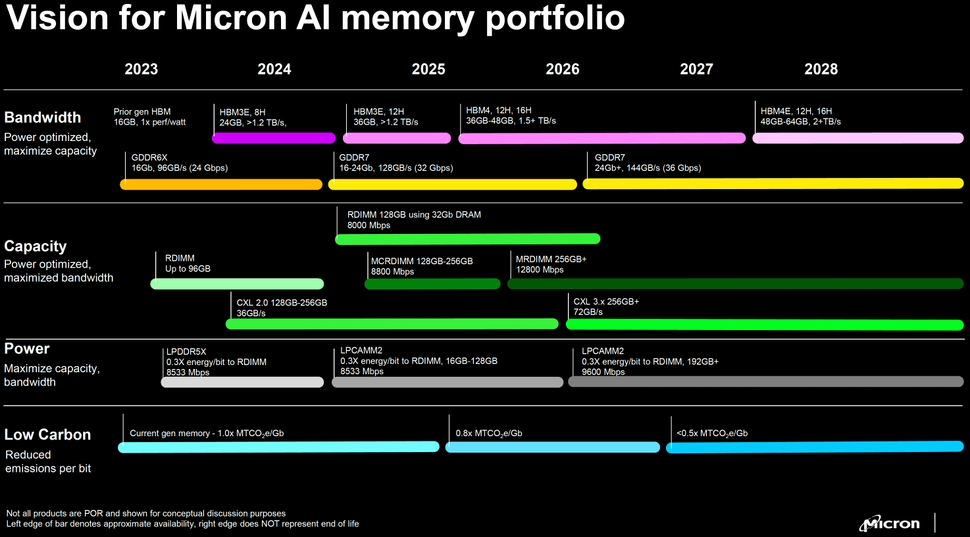Memory technology is advancing rapidly, and Micron is at the forefront of these developments. The company has big plans for the next few years, with a roadmap that includes new products like HBM4E and GDDR7 memory and 256GB RAM with MR DIMM designs. These innovations will provide a significant boost to gaming and data centre applications.
According to Micron's roadmap shared by Tom's Hardware, Micron is making significant progress in High-Bandwidth-Memory (HBM). The latest roadmap outlines the company's plans for the future, including the first delivery of 24GB 8-stack HBM3e memory in early 2024. This will be followed by higher capacity modules, such as 36GB modules with 12 stacks in 2025.

Image credit: Tom's Hardware
Micron is also working on HBM4 and its successor, HBM4e. The initial generation will come out in 2026–2027 and prioritise 12 and 16 stacks with sizes ranging from 36GB to 48GB, with an increased bandwidth of up to 1.5TB/s. Micron is expected to release its HBM4E memory with 12 and 16 stacks in 2028, with a capacity increase from 48 to 64GB per stack and a bandwidth increase to an impressive 2TB/s.
Data centre applications won't be the only ones benefiting from Micron's advancements. The launch of GDDR7 technology in late 2024 will offer an upgrade in the gaming segment, with the first batch of GDDR7 chips projected to increase bandwidth to 32Gbps in 24Gb modules. This will allow for more advanced memory configurations on consumer graphics cards. And it doesn't stop there – GDDR7 memory with a speed of 36Gbps is projected to land in 2027 and 2028.
In 2025, Micron will release MCRDIMM (Multiplexer Combined Ranks DIMM) memory with capacities ranging from 128 to 256GB and transfer speeds up to 8800MT/s. Over the following years, the company will work to improve bandwidth, with estimates suggesting speeds of up to 12800MT/s by 2026/2027.
Discuss on our Facebook page, HERE.
KitGuru says: With GDDR7 coming as soon as late 2024, there's a good chance that Nvidia or AMD will use the new memory technology on their next-generation graphics cards.
 KitGuru KitGuru.net – Tech News | Hardware News | Hardware Reviews | IOS | Mobile | Gaming | Graphics Cards
KitGuru KitGuru.net – Tech News | Hardware News | Hardware Reviews | IOS | Mobile | Gaming | Graphics Cards


